Profile: Oskar Groening, 'book-keeper of Auschwitz'
- Published
Oskar Groening interview from a 2005 BBC documentary
Age poses a challenge for prosecutors trying to bring suspected Nazi war criminals to justice.
More than 70 years have passed since the liberation of the death camps and many of those involved have now died.
So the trial of Oskar Groening will be one of the last of its kind.
A former Nazi death camp guard, the 94-year-old has been convicted of being an accessory to the murder of at least 300,000 people and sentenced to four years in prison.
Mr Groening, known as the "book-keeper of Auschwitz", was allegedly responsible for counting banknotes confiscated from prisoners.
Prosecutors in Lueneburg, northern Germany, also allege that he hid victims' luggage away from new arrivals, to disguise the victims' fate.
Horrors of Auschwitz
Mr Groening, who began work at Auschwitz aged 21, admits witnessing the mass killing of Jews, but denies he was an "accomplice".
He has spoken publicly about his role in the camp - and it is that aspect of his case that observers such as Nazi hunter Efraim Zuroff say makes it particularly important.
"It's the first in recent history in which a defendant has talked [publicly] about the horrors of Auschwitz, that's something you almost never see," Mr Zuroff told the Wall Street Journal., external last year.
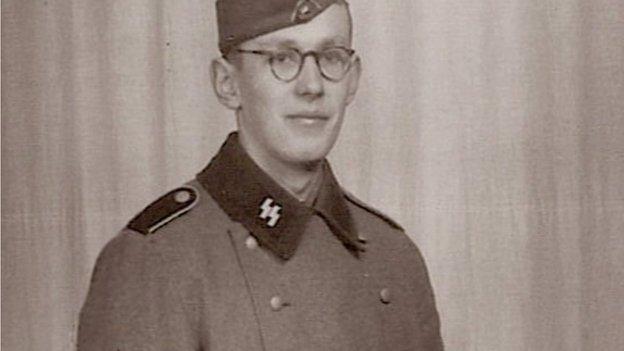
Oskar Groening signed up to the Waffen SS and arrived in Auschwitz in 1942
Mr Groening was born in 1921 in Lower Saxony in Germany, and his mother died when he was four, Germany's Der Spiegel magazine reports., external
His father, a proud nationalist, joined the Stahlhelm paramilitary group after Germany's defeat in World War One. His anger at how Germany had been treated under the Treaty of Versailles increased when his textile business went bankrupt in 1929.
The young Groening joined the Stahlhelm Youth in the early 1930s, and then the Hitler Youth. He later spoke of taking part in the Nazi burning of books written by Jews and others deemed "degenerate".
Need to speak up
British historian Laurence Rees says Mr Groening began training as a bank clerk at 17, but after war was declared, he decided he wanted to follow in his grandfathers' footsteps and join an "elite" unit in the German army.
He signed up to the Waffen SS and arrived in Auschwitz in 1942.
For about two years, Mr Groening allegedly counted money taken from the luggage of murdered Jews and sent it back to SS headquarters in Berlin. He also supervised luggage of prisoners being transported to the camp.
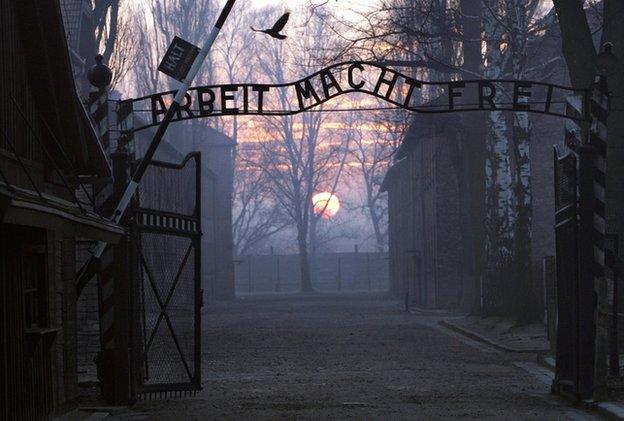
Prosecutors say Oskar Groening knew that prisoners were murdered directly after their arrival at Auschwitz
But when the war was over - and he was released from a British prison - he did not speak of his role at Auschwitz.
Instead he began a normal, middle-class life in Lueneburg Heath in Lower Saxony, where he worked at a glass-making factory until retirement.
It was not until he heard people denying the Holocaust had ever happened, decades later, that he suddenly felt the need to speak up.
"I saw the gas chambers. I saw the crematoria," he told the BBC in the 2005 documentary Auschwitz: the Nazis and the "Final Solution".
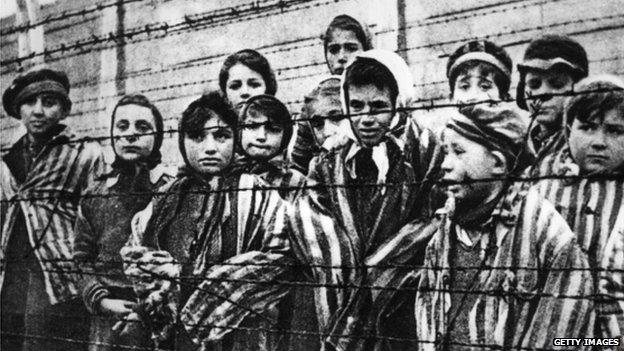
Children stand behind a barbed wire fence at Auschwitz in southern Poland in 1945
"I was on the ramp when the selections [for the gas chambers] took place."
He spoke of witnessing an SS soldier murdering a baby, and how the treatment of the prisoners had "horrified" him.
But he said that at the time he believed that killing Jews - including children - was the "right" thing to do.
"We were convinced by our world view that we had been betrayed... and that there was a great conspiracy of the Jews against us."
'I am innocent'
However, Mr Groening says he did not take part directly in the killing, and described his role as "a small cog in the gears".
"If you can describe that as guilt, then I am guilty, but not voluntarily. Legally speaking, I am innocent," he told Der Spiegel in 2005.
In the book accompanying the BBC documentary, historian Laurence Rees describes the experience of listening to Mr Groening speak about his time at Auschwitz as a "strange experience".
He says Mr Groening "shields himself" from taking full responsibility, by referring to the power of family beliefs and propaganda, but that he does not claim to have purely been following orders.
"He carried on working at Auschwitz not just because he was ordered to but because... he thought the extermination programme was right.
"It's just that that 'right' then turns out not to be 'right today'."
- Published2 February 2015
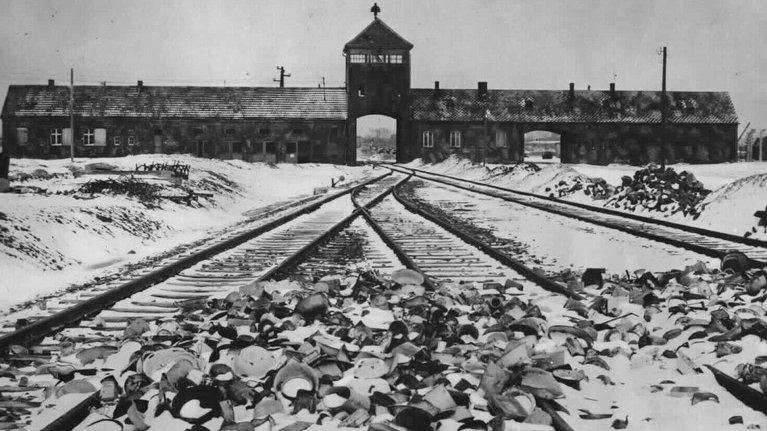
- Published23 July 2013
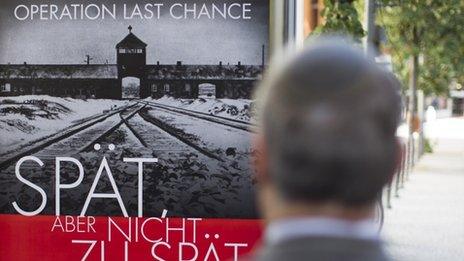
- Published17 March 2012